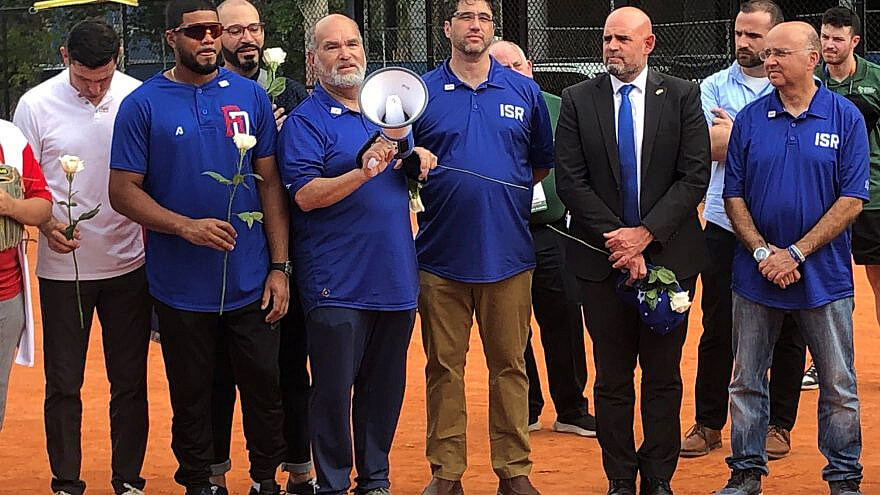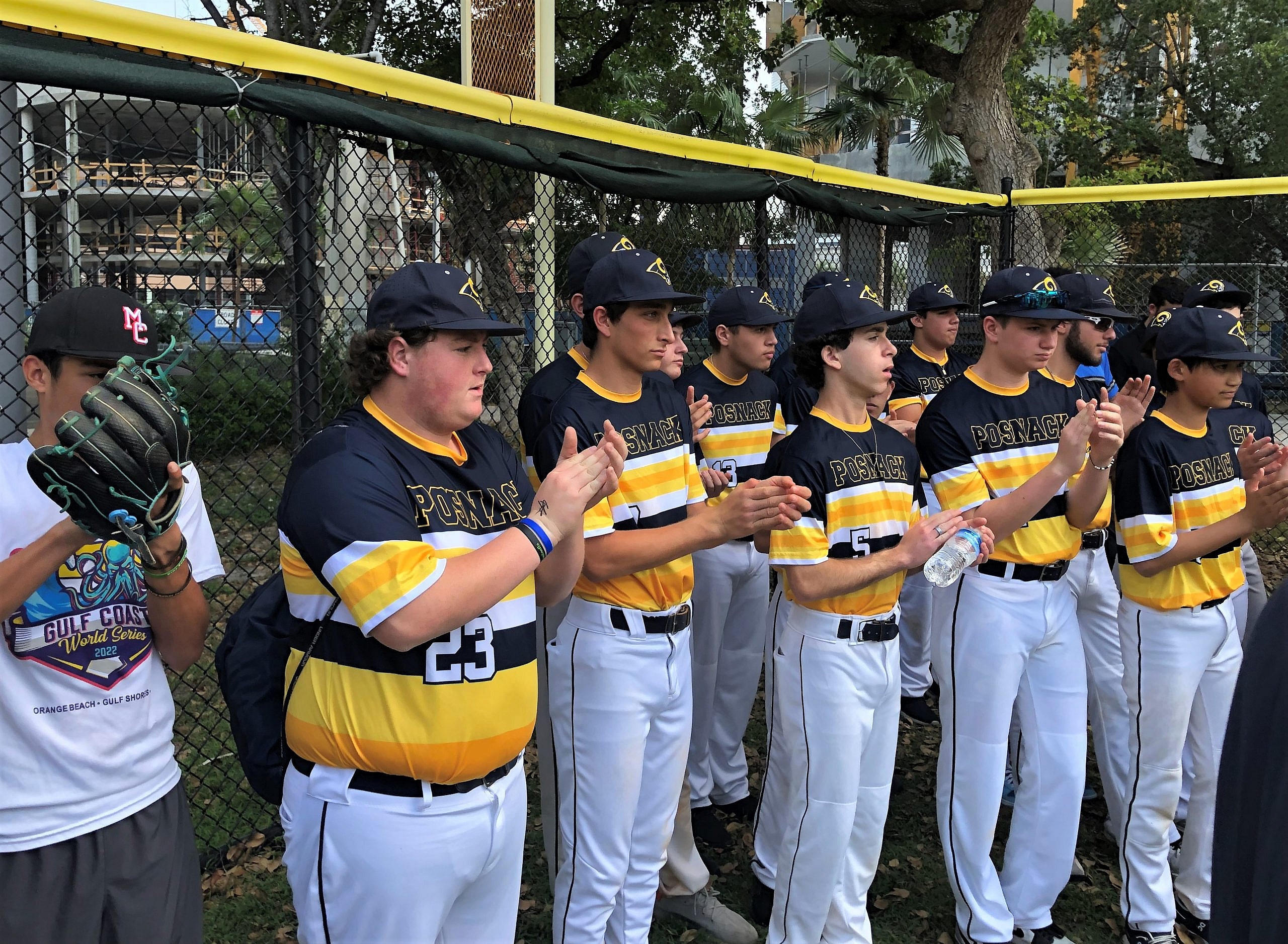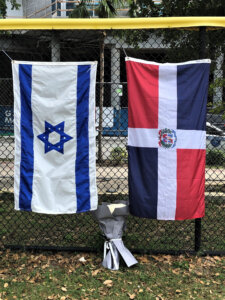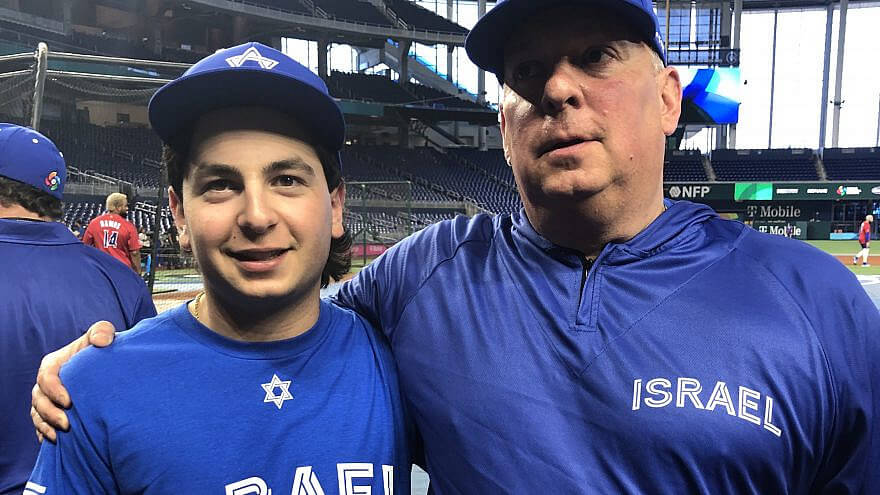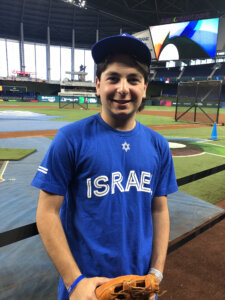Original Article Published On The JNS
“We love baseball, and we love Israel. What better way to spend time than cheering on Jewish sports,” Jeff Goldstein of Toronto, who went to see the players with his whole family, told JNS.
Much ink has spilled on the players and officials who make up Israel’s baseball team, which finished 1-3 at the World Baseball Classic in Miami. Israel competed often in front of crowds that were overwhelmingly rooting for—and drumming and trumpeting vuvuzelas on behalf of—Israel’s rivals. But those who made the trek to Florida to cheer Team Israel on are as die-hard fans as they come.
When Jewish baseball fans heard Team Israel would play in the World Baseball Classic, many rearranged their schedules to make the pilgrimage from Chicago, Toronto, Hartford, San Antonio and Atlanta. Some came from relatively “nearby” Jacksonville—five or six hours south down I-95 or I-75, depending on traffic.
Some brought their kids, others their parents. Some ditched their wives and kids to continue a 30-year tradition that predated their marriage. One clergy member bought tickets for any congregant willing to meet him in Miami and join him for dinner at Ben’s Kosher Delicatessen Restaurant & Caterers.
Brian Yancelson, a recent college graduate, and his mother Melody came to Miami from San Antonio, Alamo City, to create different sorts of memories.
The baseball-obsessed pair—who have visited all 30 MLB stadiums and 29 minor league stadiums, and have been to a 2017 World Baseball Classic game in San Diego, Field of Dreams and the Baseball Hall of Fame in Cooperstown—is already planning a baseball trip to the Dominican Republic.

Originally from Mexico City, the Yancelson mother-and-son duo felt like it fit in with both the Jewish and Latino fans. Israel was in a pool with Venezuela (4-0), Dominican Republic (2-1), Puerto Rico (2-1) and Nicaragua (0-4).
“It is really cool for Israel and Jewish people to see you don’t have to be in a little lane; you do everything at the highest level and represent the Jewish people, even if you are not so religious,” Brian, a play-by-play broadcaster and reporter, told JNS. “Being Jewish can be a lot of things for a lot of people.”
Brother-and-sister Andrew and Jennifer Small hail from Connecticut. He now lives in Manchester and she in Hamden. They have both followed Team Israel from the start. Although both of their parents are Jewish, they joke about coming from a “mixed” marriage between a Yankees fan and a Mets fan.
Andrew, who proudly sported an orange shirt with “Tigers” written in Hebrew, allowed that it could be confused for the Detroit Tigers, though he intended it to boost 44-year-old Shlomo Lipetz, who pitched for the Netanya Tigers in the 2007 season.
“I’ve been rooting for Team Israel since the World Baseball Classic qualifiers in 2017 when they captured my imagination and interest,” he said.
He went to a pre-Olympics exhibition game in Hartford and recounted, “I can’t describe how emotional it is just hearing ‘Hatikvah’ every time.”
When Israel played in the Olympics in Tokyo in 2021, Andrew stayed up late every night to watch them. “Seeing them win the Nicaragua game on Sunday was amazing,” he said.
Jennifer is glad Israel automatically qualifies for the 2026 World Baseball Classic.
“It means so much as American Jews to see us on the international stage and to see legit Jews like [Jacob] Steinmetz,” Andrew said of the Orthodox pitcher.
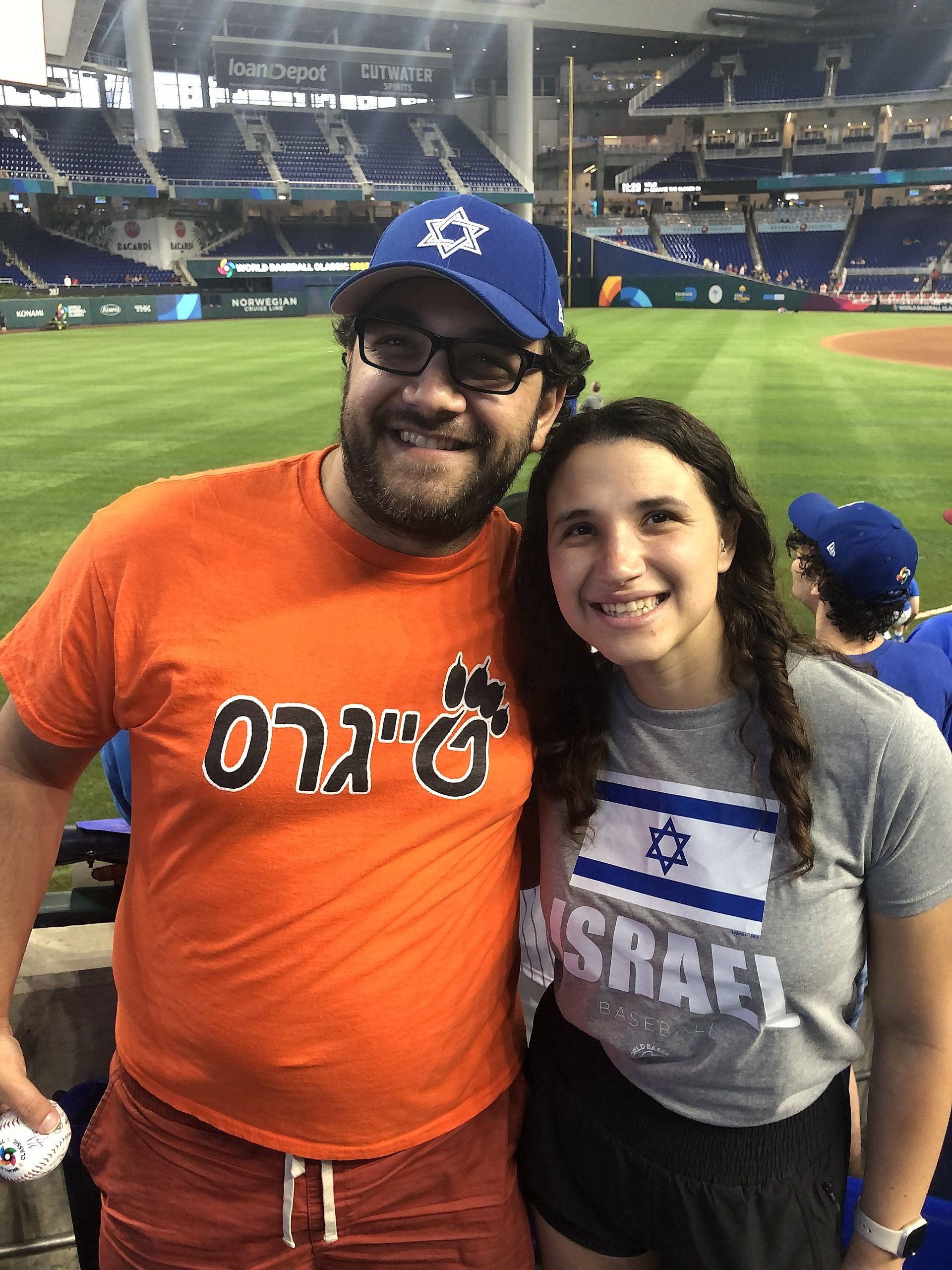
Brother and sister Andrew and Jennifer Small of Connecticut. Photo by Howard Blas.
‘We are all Zionists’
Jared Green and a half-dozen friends have a 30-year tradition of visiting ballparks that dates back to when they were fellow staffers at Camp Ramah in Canada.
The lead organizer is Mark “Liebs” Lieberman. “Please be advised that I will be out of the office participating in the 30th Annual Baseball Road Trip commencing on Friday, March 10, 2023, until Wednesday, March 15, 2023,” the Toronto law partner’s out-of-office message reads.
“Our trip is ultimately about friendships,” he told JNS. “For this year, our 30th annual baseball road, seeing Israel play made it extra-special.”
“While there wasn’t much to cheer about during the game itself, just being there together to witness Israel participating in the event itself was a great way to culminate our annual trip,” added Lieberman. “It will certainly be an experience we will all remember.”
Green, a Toronto native who lives with his family in Chicago, told JNS that the group goes to a different city each year. “We have been to every city with an MLB team,” he said. “We went to Oakland last year and went to Buffalo the COVID summer when the Blue Jays didn’t play in Toronto.”

Coming to Miami made sense since one member of the crew—hailing from Toronto, Hamilton (Canada), Chicago and Jacksonville—has a daughter who celebrated her bat mitzvah in Jacksonville. The group got to attend those festivities and catch Team Israel.
“We are all Zionists. We thought it would be fun to cheer on Team Israel,” said Green.
Not only did Jeff Goldstein of Toronto come to Miami with his wife and three sons (Michael, 11; Alex, 8; and Brayden, 4), he brought his parents as well.
A kidney specialist, Goldstein took a break from his medical practice, figuring that it would be an important part of his children’s education, even though they missed a few days of school.
“We love baseball, and we love Israel. What better way to spend time than cheering on Jewish sports,” he told JNS.
Draped in Israeli flags and singing ‘Hatikvah’
Jesse Holzer, a cantor in Jacksonville, recalls staying up late to check Team Israel’s scores when it competed in Asia. He was pretty sure he was the only person in the 29,000-seat stadium wearing a Jacksonville Jumbo Shrimp kippah. That may sound like an unkosher oxymoron, but the Jumbo Shrimp are a Jacksonville Minor League team. (Team Israel catcher Ryan Lavarnway played for the Shrimp in 2022.)
Holzer also donned a blue-and-white Israel soccer jersey with “Hazzan” (“cantor”) emblazoned on the back. He had hoped to wear a Team Israel jersey, but it didn’t arrive on time for the World Baseball Classic, so he had to improvise. The team has become so popular that he can no longer find game-worn Team Israel jerseys on eBay, as he used to be able to.

“They are nowhere to be found,” he stated.
Watching batting practice before the March 13 game against Puerto Rico on the field, Holzer could hardly contain his excitement. “To be here, to experience the moment of Jews draped in Israeli flags and singing ‘Hatikvah’ in this country, post-COVID,” he said. “To be here to support Team Israel is bashert” (the Yiddish word for “soulmate”).
At the synagogue where Holzer works, they joke that the rabbi, a Yankees fan, stands on one side of the bimah while Holzer, a Red Sox fan, is on the other. He also brings sports, which he calls “my second love,” into his work. For example, if people ask him whether it is a day to receive tachanun—a sobering prayer that is skipped on certain festive days—Holzer answers that depends on whether the day’s sports news is good or bad.
Team Israel being in town—just a five- or six-hour drive from Jacksonville—brought out the cantor’s generosity. He bought 18 tickets (a lucky Jewish number and a chai in Hebrew, meaning “life”) and offered to subsidize any congregant willing to come to Miami.
“It is mostly retirees—people who love baseball and kosher food,” he said. Holzer enjoyed dining with fellow congregants at Ben’s Deli, and, in line with stadium policy, was able to bring one deli sandwich into the game.
A Jewish cardinal (fan)
Robyn Faintich of Atlanta is a lifelong fan of the St. Louis Cardinals. An education consultant, she uses baseball and Judaism in her work, and thinks that Jewish educators can find teaching fodder in Israel’s participation in the World Baseball Classic.
When Israel played Puerto Rico, she had a dilemma, as the latter’s manager is former Cardinals legend Yadier Molina. Her love of Israel prevailed, she told JNS.
Having watched two films about Team Israel’s World Baseball Classic and Olympics runs, Faintich was drawn to the way players were connecting for the first time with their Jewish identities.
“They guys had to trace their lineage, which they had never considered. They were discovering and figuring out their heritage and relationship to Israel—and all of a sudden were making aliyah,” she said.
“This part of the story is a major piece for kids without a major connection. They can see all of these players on MLB teams as a case in point,” she added.
When Kevin Youkilis, a Team Israel coach, took off his cap during the Israeli national anthem to reveal a Team Israel kippah, Faintich saw a teachable moment.
“It tells the story of taking Jewish heritage and turning it into an expression of Jewish identity,” she said. “These players are good role models for Jews who may be disconnected.”
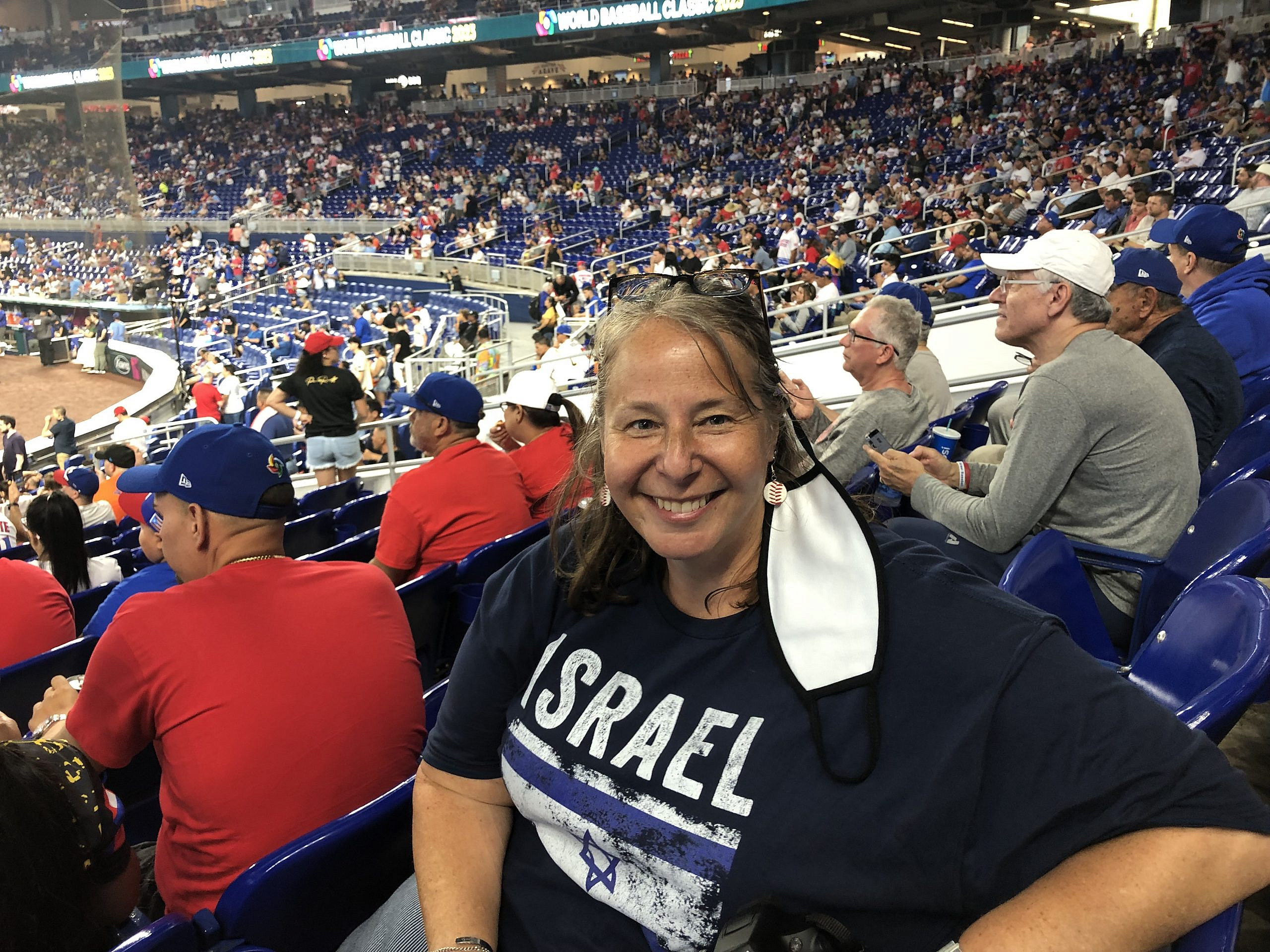
Robyn Faintich of Atlanta. Photo by Howard Blas.


